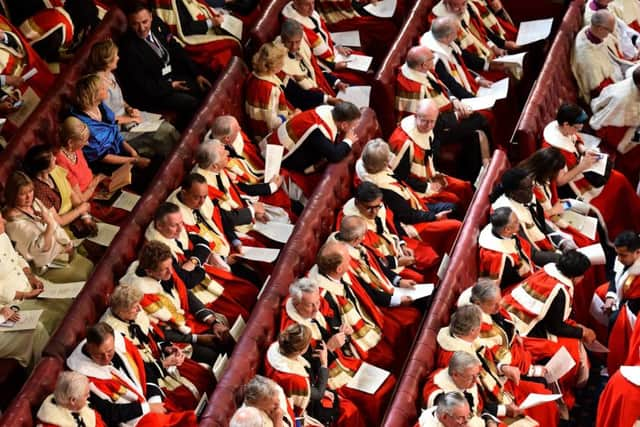Brian Monteith: Ditch the power of patronage


I do not know Michelle Mone and therefore must give her the benefit of the doubt regarding her ability to be a success in her new role as a UK government business tsar, but the circumstances of her appointment, and the possibility she may yet go to the Lords, raises questions worthy of consideration.
Michelle Mone has become something of a Marmite figure in Scotland. As with anyone in this land that offers the appearance of doing well in comparison to the competition from south of the Border, or indeed internationally, Mone has been good copy for our media. Like rock stars and football heroes, business figures can become overnight sensations only to then be brought down by critics who think they are getting too big for their own good. Lauded for her success in building a lingerie business often described as an empire, she has found like many before her that she can easily become the target of different interest groups and, as a result, will become knocked down from the pedestal she has been placed upon.
Advertisement
Hide AdAdvertisement
Hide AdNever backward in coming forward with her opinions on matters beyond the rag trade, Mone has attracted criticism for her comments on the economy and the constitution. By openly siding with the unionist No camp – a rather brave and outspoken position when so many chose to say nothing – she attracted a great deal of social media abuse, not least for her comments that she and her business would move south if the Yes campaign won. After the No vote, she has moved south anyway, while leaving her company HQ in Scotland.


In the past, she has been known as a supporter of the Labour Party but now enjoys good relations with the Conservatives after criticising Gordon Brown and switching sides before the 2010 general election. Such political infidelity is not unusual for business people who can often see their politics on an issue-by-issue basis, but it does tend to grate with those in either party that have formed longer-term commitments based on principle rather than pragmatism, or what might also be seen as opportunism.
Now David Cameron has reportedly nominated Mone to become a Tory peer, an appointment that, if confirmed, will do nothing to help the Conservatives in Scotland, thanks to her departure, and politically is an odd choice.
If Cameron needs anything, it is working peers that can defend their appointment through established political credibility and merit built upon years of being elected to office and the experience that comes with it. As an example, the repeated passing over of Struan Stevenson, the former Scottish Conservative MEP who retired from that post last year, is inexplicable. Having enjoyed elected office for over 40 years, from his days as a young town councillor before local government reorganisation in the 70s through to being a council group leader and then the toil of commuting to Brussels and Strasbourg, Stevenson’s appointment to the Lords would be hard to criticise.
By instead choosing a business figure whose reputation for starting up successful new businesses has even been questioned by fellow Conservatives, Cameron has undermined both the case for the Lords and his own party in Scotland.
Mone may yet prove her critics wrong in displaying some political nous and offering their lordships business insight – as well as bringing relative youth that the Upper House badly needs – but that is not the point. What Mone’s appointment as a business tsar and her probable elevation show is that there is a genuine need to reform the UK’s democratic machinery to bring it both accountability and legitimacy.
The power of patronage has an important role in politics, but it should not be above public scrutiny. Such has been the growth of first the quangocrats in the seventies and eighties, and then the multitude of tsars in the nineties and noughties, that there is a genuine public concern about the abuse of the system by those with the power to make the appointments.
In pre-devolution Scotland, our quangos were habitually packed with “Old Labour” lags and trade union officials, so that when any Tory was appointed it caused surprise and faux outrage from opponents. Since then, the situation has changed, with SNP nominations slowly replacing the previous placemen and women, changing the nature of Scotland’s political establishment. Naturally, the previous SNP talk of adopting an American-style system of public hearings where nominees would be grilled before appointments could be confirmed has quietly been forgotten.
Advertisement
Hide AdAdvertisement
Hide AdWould it not be beneficial to the reputation of our democracy – and indeed to Mone herself – if she were to be called to explain her experience and be open to questions before one of Westminster’s relevant parliamentary committees? Should this not be the standard procedure for all such appointments in every parliament? This would not only help to challenge any claims of public jobs for political donors, it would give those that are endorsed a seal of greater legitimacy.
Likewise, there is no political reason Mone should not be in the Lords – there are many that have gone before her that I could argue are less worthy in what they have achieved or offered (other than political loyalty to their party of nomination). Nevertheless, the system of appointment is bankrupt of credibility and open to corruption.
The Lords should become a senate; it should have its own one-term-only senators elected by popular mandate and it should have representatives from the parliaments of the Union’s constituent nations. That does not rule out the possibility of also leaving open a limited number of positions for appointed members, but there is an argument to be had about whether they should or should not have a vote in deciding legislation and there should at least be some transparent procedure for such members to be scrutinised, as with other public appointments.
As it stands, the only real scrutiny the public gets for any of these positions – some of which come with taxpayer-funded remuneration and allowances – is from the media, which can be voracious in unearthing unhelpful facts and past indiscretions to the embarrassment of the appointee. Surely it is better to all concerned to provide an open arena where evidence of suitability can be discussed and appointees at least have the opportunity to defend themselves? If Mone’s appointments bring any reforms closer, she will have served a public service.